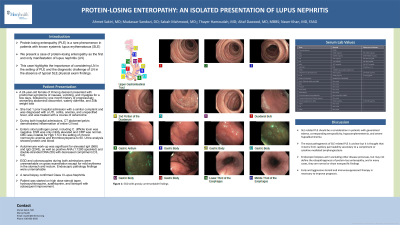Monday Poster Session
Category: Small Intestine
P2658 - Protein-Losing Enteropathy: An Isolated Presentation of Lupus Nephritis
Monday, October 23, 2023
10:30 AM - 4:15 PM PT
Location: Exhibit Hall

Has Audio

Ahmet Sakiri, MD
MercyHealth
Rockford, IL
Presenting Author(s)
Ahmet Sakiri, MD, Mudassar Sandozi, DO, Sabah Mahmood, MD, Thayer Hamoudah, MD, Altaf Dawood, MD, MBBS, Naser Khan, MD
MercyHealth, Rockford, IL
Introduction: Protein-losing enteropathy (PLE) is a rare phenomenon in patients with known systemic lupus erythematosus (SLE). We present a case of protein-losing enteropathy as the first and only manifestation of lupus nephritis (LN). This case highlights the importance of considering LN in the setting of PLE and the diagnostic challenge of LN in the absence of typical SLE physical exam findings.
Case Description/Methods: A 24-year-old female of Hmong descent presented with prodromal symptoms of nausea, vomiting, and myalgias for a few days, followed by one month history of progressively worsening abdominal discomfort, watery diarrhea, and 25lb weight loss. She had 1 prior hospital admission with a similar complaint and was diagnosed with a UTI, colitis, anemia, and unspecified fever, and was treated with a course of cefuroxime. During both hospital admissions, CT abdomen/pelvis demonstrated inflammation of entire GI tract. Enteric stool pathogen panel, including C. difficile toxin was negative. ESR was only mildly elevated and CRP was normal. CBC was notable for Hgb 7.5 in the setting of chronic normocytic anemia and thrombocytopenia to 60. Urine analysis showed protein and blood. Autoimmune work-up was significant for elevated IgA (568) and IgG (2245), as well as positive ANA (1:1280 speckled) and double-stranded DNA (59) with decreased compliment (C3, C4). Urinalysis was positive for protein and blood. EGD and colonoscopies during both admissions were unremarkable on gross examination with the exception of mild erythema in the stomach and rectum. Endoscopic pathology findings were unremarkable. A renal biopsy confirmed Class II Lupus Nephritis. Patient was started on high dose steroid taper, hydroxychloroquine, azathioprine, and lisinopril with subsequent improvement.
Discussion: SLE related PLE should be a consideration in patients with generalized edema, corresponding seropositivity, hypocomplementemia, and severe hypoalbuminemia. The exact pathogenesis of SLE-related PLE is unclear but it is thought that it stems from capillary permeability secondary to a compliment or cytokine mediated lymphangiectasia. Endoscopic biopsies aid in excluding other disease processes, but may not may not define the etiopathogenesis of protein-loss enteropathy, and in many cases, they are normal or show nonspecific findings. Early and aggressive steroid and immunosuppressant therapy is necessary to improve prognosis.
Disclosures:
Ahmet Sakiri, MD, Mudassar Sandozi, DO, Sabah Mahmood, MD, Thayer Hamoudah, MD, Altaf Dawood, MD, MBBS, Naser Khan, MD. P2658 - Protein-Losing Enteropathy: An Isolated Presentation of Lupus Nephritis, ACG 2023 Annual Scientific Meeting Abstracts. Vancouver, BC, Canada: American College of Gastroenterology.
MercyHealth, Rockford, IL
Introduction: Protein-losing enteropathy (PLE) is a rare phenomenon in patients with known systemic lupus erythematosus (SLE). We present a case of protein-losing enteropathy as the first and only manifestation of lupus nephritis (LN). This case highlights the importance of considering LN in the setting of PLE and the diagnostic challenge of LN in the absence of typical SLE physical exam findings.
Case Description/Methods: A 24-year-old female of Hmong descent presented with prodromal symptoms of nausea, vomiting, and myalgias for a few days, followed by one month history of progressively worsening abdominal discomfort, watery diarrhea, and 25lb weight loss. She had 1 prior hospital admission with a similar complaint and was diagnosed with a UTI, colitis, anemia, and unspecified fever, and was treated with a course of cefuroxime. During both hospital admissions, CT abdomen/pelvis demonstrated inflammation of entire GI tract. Enteric stool pathogen panel, including C. difficile toxin was negative. ESR was only mildly elevated and CRP was normal. CBC was notable for Hgb 7.5 in the setting of chronic normocytic anemia and thrombocytopenia to 60. Urine analysis showed protein and blood. Autoimmune work-up was significant for elevated IgA (568) and IgG (2245), as well as positive ANA (1:1280 speckled) and double-stranded DNA (59) with decreased compliment (C3, C4). Urinalysis was positive for protein and blood. EGD and colonoscopies during both admissions were unremarkable on gross examination with the exception of mild erythema in the stomach and rectum. Endoscopic pathology findings were unremarkable. A renal biopsy confirmed Class II Lupus Nephritis. Patient was started on high dose steroid taper, hydroxychloroquine, azathioprine, and lisinopril with subsequent improvement.
Discussion: SLE related PLE should be a consideration in patients with generalized edema, corresponding seropositivity, hypocomplementemia, and severe hypoalbuminemia. The exact pathogenesis of SLE-related PLE is unclear but it is thought that it stems from capillary permeability secondary to a compliment or cytokine mediated lymphangiectasia. Endoscopic biopsies aid in excluding other disease processes, but may not may not define the etiopathogenesis of protein-loss enteropathy, and in many cases, they are normal or show nonspecific findings. Early and aggressive steroid and immunosuppressant therapy is necessary to improve prognosis.
Disclosures:
Ahmet Sakiri indicated no relevant financial relationships.
Mudassar Sandozi indicated no relevant financial relationships.
Sabah Mahmood indicated no relevant financial relationships.
Thayer Hamoudah indicated no relevant financial relationships.
Altaf Dawood indicated no relevant financial relationships.
Naser Khan indicated no relevant financial relationships.
Ahmet Sakiri, MD, Mudassar Sandozi, DO, Sabah Mahmood, MD, Thayer Hamoudah, MD, Altaf Dawood, MD, MBBS, Naser Khan, MD. P2658 - Protein-Losing Enteropathy: An Isolated Presentation of Lupus Nephritis, ACG 2023 Annual Scientific Meeting Abstracts. Vancouver, BC, Canada: American College of Gastroenterology.
